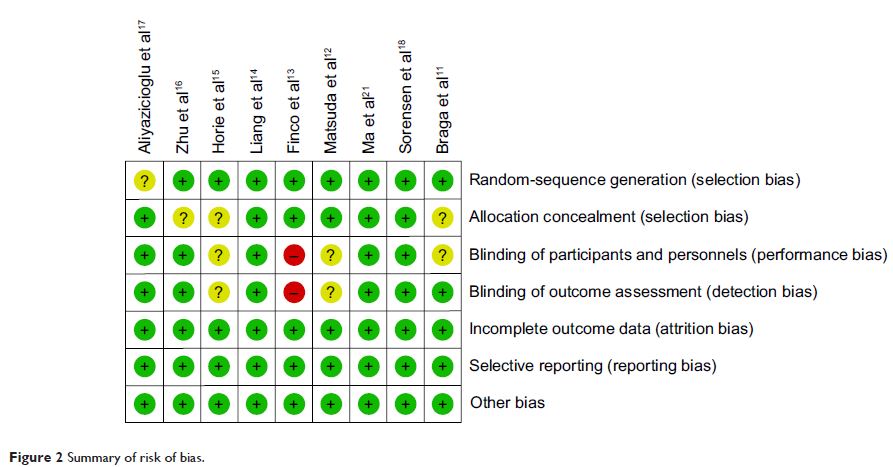109568
论文已发表
注册即可获取德孚的最新动态
IF 收录期刊
- 3.4 Breast Cancer (Dove Med Press)
- 3.2 Clin Epidemiol
- 2.6 Cancer Manag Res
- 2.9 Infect Drug Resist
- 3.7 Clin Interv Aging
- 5.1 Drug Des Dev Ther
- 3.1 Int J Chronic Obstr
- 6.6 Int J Nanomed
- 2.6 Int J Women's Health
- 2.9 Neuropsych Dis Treat
- 2.8 OncoTargets Ther
- 2.0 Patient Prefer Adher
- 2.2 Ther Clin Risk Manag
- 2.5 J Pain Res
- 3.0 Diabet Metab Synd Ob
- 3.2 Psychol Res Behav Ma
- 3.4 Nat Sci Sleep
- 1.8 Pharmgenomics Pers Med
- 2.0 Risk Manag Healthc Policy
- 4.1 J Inflamm Res
- 2.0 Int J Gen Med
- 3.4 J Hepatocell Carcinoma
- 3.0 J Asthma Allergy
- 2.2 Clin Cosmet Investig Dermatol
- 2.4 J Multidiscip Healthc

Omega-3 多不饱和脂肪酸在预防结直肠癌术后并发症中的应用:一项综合分析
Authors Xie H, Chang Y
Received 25 May 2016
Accepted for publication 19 October 2016
Published 9 December 2016 Volume 2016:9 Pages 7435—7443
DOI https://doi.org/10.2147/OTT.S113575
Checked for plagiarism Yes
Review by Single-blind
Peer reviewers approved by Dr Akshita Wason
Peer reviewer comments 3
Editor who approved publication: Prof. Dr. Geoffrey Pietersz
Objective: To evaluate systematically the clinical efficacy of omega-3
polyunsaturated fatty acids (PUFAs) in the prevention of postoperative
complications in colorectal cancer (CRC) patients.
Materials and methods: Published articles were identified by using search
terms in online databases – PubMed, Embase, and the Cochrane Library – up to
March 2016. Only randomized controlled trials investigating the efficacy of
omega-3 PUFAs in CRC were selected and analyzed through a meta-analysis.
Subgroup, sensitivity, and inverted funnel-plot analyses were also conducted.
Results: Eleven articles with 694 CRC patients were finally
included. Compared with control, omega-3 PUFA-enriched enteral or parenteral
nutrition during the perioperative period reduced infectious complications
(risk ratio [RR] 0.63, 95% confidence interval [CI] 0.47–0.86; P =0.004), tumor
necrosis factor alpha (standard mean difference [SMD] -0.37, 95% CI -0.66 to
-0.07; P =0.01), interleukin-6
(SMD -0.36, 95% CI -0.66 to -0.07; P =0.02), and hospital stay (MD
-2.09, 95% CI -3.71 to -0.48; P =0.01). No significant difference
was found in total complications, surgical site infection, or CD4+:CD8+ cell ratio.
Conclusion: Short-term omega-3 PUFA administration was associated
with reduced postoperative infectious complications, inflammatory cytokines,
and hospital stay after CRC surgery. Due to heterogeneity and relatively small
sample size, the optimal timing and route of administration deserve further
study.
Keywords: omega-3,
fatty acids, fish oil, colorectal surgery, meta-analysis
